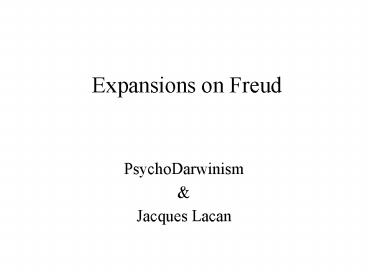Expansions on Freud - PowerPoint PPT Presentation
1 / 12
Title:
Expansions on Freud
Description:
Freud also belied in IoAC, in terms of instincts which could be passed on from ... Freud recognised 'archaic hertiage', unconscious drives that were inherited from ... – PowerPoint PPT presentation
Number of Views:37
Avg rating:3.0/5.0
Title: Expansions on Freud
1
Expansions on Freud
- PsychoDarwinism
- Jacques Lacan
2
Freud and Lemark
- Lemark and The Inheritance of Aquired
Characteristics - A lizard tries to stretch
- its tongue so often that the
- tongue becomes longer and
- this trait is passed to its children
- Freud also belied in IoAC, in terms of instincts
which could be passed on from previous
generations.
3
Links between Freud Darwin
- Freud highly influenced by "The Expressions of
Emotions in man and animals" - Freud recognised "archaic hertiage", unconscious
drives that were inherited from our ancestors. - Freud also recognised that that man might be seen
as a "vehicle for his germplasm.... receiving
pleasure as his reward" . - Freud saw our sexual drive as the force behind
the ID.
- Darwin wrote the The Expressions of Emotions in
man and animals" - Darwin recognised instinctual drives that are
inherited from our parents. - Darwinian theory sees evolution as a process
where success is rewarded by the ability to pass
on your genes. - Darwin saw the need to reproduce as the most
significant drive in an organisms life.
4
PsychoDarwinism The Unconscious
- The unconscious developed as a place to hide
those traits which were undesirable to society - undesirability threat our reproductive chances.
- Other things might be hidden in the unconscious
as a way of preventing us from tampering with
them,
5
PsychoDarwinism the ID, EGO and SUPEREGO
- The ID, EGO and SUPEREGO could all be
re-interpreted in adaptive terms. - ID - the basic biological drive to reproduce
- SUPEREGO - a monitor of those of societies rules
that are relevant to attracting a mate. - EGO - an executive to balance the adaptive
priorities of the ID's drive demands and the
SUPEREGOs rules.
6
Narcissism as an adaptive quality
- Freud said that
- The libido might become focused on the ego to
produce self-love or narcissism. - This is more likely prior to sexual maturity and
drops off dramatically afterwards. - Is this adaptive?
- Narcissim is negatively correlated with
risk-taking or self-sacrificing behaviour. - People rate Narcissism as an unattractive quality
in a mate.
7
Further Study
- Badcock, C. (1995) PsychoDarwinism The new
synthesis of Darwin and Freud. Harper Colins. - http//www.thegreatdebate.org.uk/index.html
- Website relating to a series of public debates
and seminars on subjects such as the human
nature, the mind and the role of evolution.
Badcock is one of the contributers
8
Lacanian Psychoanalysis
- Jaques Lacan 1901 1981
- Reinterpret Freud in light of structuraist and
post-structuralist philosophies. - Moves away from biological and emphasises
cultural and linguistic forces. - Biology is interpreted and interacts with the
world around it through language and discourse.
9
Lacanian Unconscious
- Lacan believed we use language to express our
desires, but that language can never quite
express our desires. - He also believed that we do not completely
control the language that we speak and as a
result we are somewhat at it's mercy. - The unconscious
- arises as a function of the language we use.
- exists between people, not within the individual.
- Is structured, a coherent self, not a place of
dark regressive tendencies.
10
Lacan and the Ego
- Between 6 and 18 months go through the mirror
stage. - They see themselves in a mirror and achieve
identification by recognising that the person in
the mirror is them. - But the identification is a false one as the
image in the mirror is not us (it conceals our
flaws, e.g. we are weak and uncoordinated at that
age).
11
Lacan and the Ego
- This identification forms the basis of our
identity it is the birth point of the ego - So whats wrong with that?
- It is based on a false identification
- Thus the ego alienates use from our true selves.
- This illusion doesn't match reality it needs
constant propping up (ego defences) - As such the role of analysis should not be the
reinforcing of these defences but tearing them
down.
12
Further Study
- Sarup, M. (1992) Jaques Lacan. Harvester
Wheatsheaf. - www.lacan.com American Lacanian Supporters
- www.lacan.org































